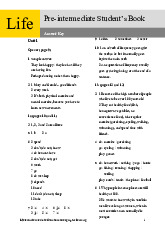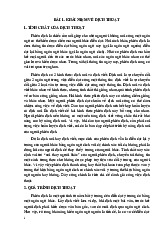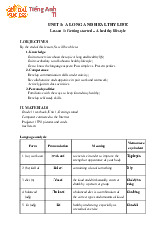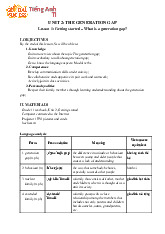





Preview text:
LESSON PLAN
TIẾNG ANH 11 FRIENDS GLOBAL UNIT 1: GENERATIONS
LESSON 1G- SPEAKING: ROLE- PLAY I. OBJECTIVES
By the end of this lesson, Ss will be able to: 1. Knowledge
- Role-play a conversation about an exchange programme.
- Gain vocabulary to understand exchange programmes. 2. Competences
- Develop communication skills and creativity.
- Be collaborative and supportive in pair work and teamwork.
- Actively join in class activities. 3. Personal qualities
- Understand the grammar of using should and ought to for advice. - Develop self-study skills. II. MATERIALS
- Grade 11 textbook, Unit 1, Speaking
- Computer connected to the Internet
- Projector / TV/ pictures and cards
- Phần mềm tương tác sachso.vn Language analysis Form Pronunciation Meaning
a belief in your own ability to do things and be 1. confidence (n) /ˈkɒnfɪdəns/ successful
an arrangement in which people from different /ɪksˈtʃeɪndʒ 2. exchange programme (n)
countries visit each other's country to improve ˈprəʊɡræm/ foreign language skills
a person who invites guests to a meal, a party, 3. host (n) /həʊst/
etc. or who has people staying at their house Assumption
Anticipated difficulties Solutions
- Encourage students to work in pairs and in groups so
Students are reluctant to work in
that they can help each other. groups.
- Provide feedback and help if necessary.
- Explain expectations for each task in detail.
- Continue to explain task expectations in small
chunks (before every activity).
Students may lack vocabulary to deliver - Provide vocabulary and useful language before a speech assigning tasks
- Encourage students to work in groups so that they can help each other. III. PROCEDURES 1. WARM-UP (7 mins) a. Objectives:
- Introduce the new lesson and set the scene for Ss to acquire new language.
- Get students' attention at the beginning of the class by means of enjoyable and short
activities as well as to engage them in the steps that followed. b. Content: - Exercise 1. (p.20) c. Expected outcomes:
- Students can gain more confidence and interest in the lesson. d. Organisation
TEACHER’S AND STUDENTS’ ACTIVITIES CONTENTS
Exercise 1: Work in pairs. Look at the advert below. In your opinion, what would be the best and
worst things about spending a year with a family abroad? Use the prompts below and your own ideas. (7 mins)
- Focus attention on the advert and explain to students Students’ performance
that it shows a student who is spending a year with a family abroad.
- Go through the instructions and prompts together.
Then give students two minutes to brainstorm more ideas.
- Elicit ideas and write them on the board.
- In pairs, students discuss the questions using the
prompts in the book and the ideas on the board.
- Ask a few students to share their ideas with the class e. Assessment
- Teacher observes the groups and give feedback.
2. ACTIVITY 1: PRESENTATION (12 mins) a. Objectives:
- To get students learn vocabulary related to the topic.
- To get students understand speaking strategy of how to use the preparation time. b. Content:
- Pre-teach vocabulary related to the topic. - Exercise 2 (p.20) - Exercise 3 (p.20) c. Expected outcomes:
- Ss know how to pronounce the new words precisely and use them in appropriate contexts.
- Ss can do the gapped-sentence tasks successfully. d. Organisation
TEACHER’S AND STUDENTS’ ACTIVITIES CONTENTS
Vocabulary pre-teaching (4 mins) New words:
- Teacher introduces the vocabulary. 1. confidence (n)
- Teacher explains the meaning of the new vocabulary 2. exchange programme (n) by pictures. 3. host (n)
- Teacher checks students’ understanding.
- Teacher reveals that these words will appear in the
reading text and asks students to open their textbook to discover further.
Exercise 2. Read the Speaking Strategy and the task above. Then match one or two of the ideas
below with each topic. (5 mins)
- Go through the Speaking Strategy together. Answer:
- Ask students to think how else they could use their
• getting to know your exchange
preparation time, e.g. thinking of vocabulary they can
student: doing hobbies together.
use in the activity, tenses, etc.
• useful things to take with you:
- Working individually, students match the ideas with carrying a dictionary. the topics.
• going to school in England eating in - Check answers as a class
the canteen, wearing a uniform.
• advice about staying with an English
family keeping your room tidy, helping with housework.
Exercise 3. Listen to a student doing the task from exercise 2. Does she discuss all the topics?
Which ideas from the exercise does she mention? (3 mins)
- Go through the instructions together. Answers:
- Play the recording for students to answer the questions. - Check answers as a class
She discusses all the topics. She mentions
doing hobbies together, eating in the canteen and wearing a uniform. e. Assessment
- Teacher checks students’ pronunciation and gives feedback.
- Teacher checks students’ understanding of speaking strategy.
- Teacher observes Ss’ writing of vocabulary on their notebooks.
3. ACTIVITY 2: PRACTICE (13 mins) a. Objectives:
- Ss understand how to use “should and ought to” for giving advice.
- Ss can answer the questions to critical thinking.
- They can also finish the tasks in the textbook. b. Content: - Exercise 4. (p.20) - Exercise 5. (p.20) - Exercise 6. (p.20) c. Expected outcomes:
- Students can thoroughly understand the content of the text and complete the tasks successfully. d. Organisation
TEACHER’S AND STUDENTS’ ACTIVITIES CONTENTS
Exercise 4. Read the Learn this! box. Then complete sentences 1–3 using the words in brackets.
Do not change the words, but add extra words if necessary (5 mins)
- Go through the Learn this! box together. Point Students’ performance
out that “I don’t think you should” is more polite
and less direct than “you shouldn’t”.
- With a weaker class, remind students that should
/ ought to is followed by infinitive without to.
- Students complete the sentences. Do not check answers at this point.
Exercise 5. Listen again. Check your answers to exercise 4. (3 mins)
- Play the recording again for students to check Answer key: their answers. 1. ought to find out. 2. think you should send. 3. ought to take.
Exercise 6. Work in pairs. Student A is an English student who is going to stay with Student B’s
family next month. Ask for and give advice about these topics. (5 mins)
- Put students in pairs, Student A and Student B. Students’ performance
- Students go through the topics together. Tell
them to practise making questions about the topics.
- Students then work individually to decide how
they can answer each question using should and
ought to. Circulate and monitor, helping with
grammar and vocabulary where necessary. e. Assessment
- Teacher observation on Ss’ performance.
- Teacher’s feedback and peers’ feedback.
4. ACTIVITY 3: PRODUCTION (10 mins) a. Objectives:
- To help Ss practice speaking skills.
- To help Ss understand the how to give advice. b. Content:
- Group-work, role-play, discussion. - Exercise 7 (p.20) c. Expected outcomes:
- Students can make a conversation about various aspects of exchange programmes. d. Organisation
TEACHER’S AND STUDENTS’ ACTIVITIES CONTENTS
Exercise 7. Work in groups. Read the task below. Think of two ideas for each topic and make
notes. Then do the task. (10 mins)
- Go through the instructions and task together.
Students’ own creativity.
- Working individually, students make notes.
- In pairs, students do the task. Circulate and monitor,
making a note of any mistakes you hear for a group
feedback session at the end of the lesson. e. Assessment
- Teacher observation on Ss’ performance.
- Teacher’s feedback and peers’ feedback. 5. CONSOLIDATION (3 mins) a. Wrap-up
- T asks Ss to talk about what they have learnt in the lesson. b. Homework - Prepare for the next lesson Board Plan Date of teaching
TIẾNG ANH 11 FRIENDS GLOBAL UNIT 1: GENERATIONS
LESSON 1G- SPEAKING: ROLE-PLAY * Warm-up - Exercise 1 * Vocabulary 1. confidence (n) 2. exchange programme (n) 3. host (n) * Presentation - Exercise 2 - Exercise 3 * Practice - Exercise 4 - Exercise 5 - Exercise 6 * Production - Exercise 7 *Homework




